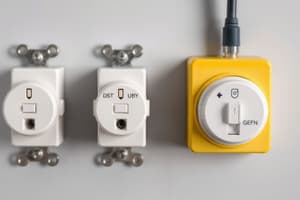Podcast
Questions and Answers
Which of the following appliances typically require 240 Volts?
Which of the following appliances typically require 240 Volts?
- Refrigerator
- Clothes dryer (correct)
- Television
- Lamp
A GFI outlet can only be installed in bedrooms.
A GFI outlet can only be installed in bedrooms.
False (B)
What does the grounding pin in a socket do?
What does the grounding pin in a socket do?
Takes excess charge to the ground for safety.
A __________ is a circuit without an electrical load.
A __________ is a circuit without an electrical load.
Match the following voltages with their typical uses:
Match the following voltages with their typical uses:
Why are larger cables used for 240 V appliances?
Why are larger cables used for 240 V appliances?
A GFI outlet resets itself automatically without any user intervention.
A GFI outlet resets itself automatically without any user intervention.
Why do larger cables and plugs have a lesser tendency to get hot?
Why do larger cables and plugs have a lesser tendency to get hot?
Excess charge that touches an appliance surface is redirected to the ground by the __________.
Excess charge that touches an appliance surface is redirected to the ground by the __________.
What happens when a GFI detects an imbalance in current?
What happens when a GFI detects an imbalance in current?
Flashcards
Current
Current
The amount of electrical energy flowing through a circuit.
Voltage
Voltage
The force that pushes electrical current through a circuit.
Resistance
Resistance
A measure of how much a material resists the flow of electricity.
Circuit Breaker
Circuit Breaker
Signup and view all the flashcards
Grounding
Grounding
Signup and view all the flashcards
GFI (Ground Fault Interrupter)
GFI (Ground Fault Interrupter)
Signup and view all the flashcards
Short Circuit
Short Circuit
Signup and view all the flashcards
Ammeter
Ammeter
Signup and view all the flashcards
Voltmeter
Voltmeter
Signup and view all the flashcards
Circuit
Circuit
Signup and view all the flashcards
Study Notes
Electrical Safety
- Higher voltage circuits, thicker wires, and grounding enhance home circuit safety.
- Most household appliances operate on 120 volts, but some larger ones (e.g., clothes dryers, ovens) use 240 volts.
- Higher voltage (240V) reduces the current needed for safety.
- Larger cables associated with higher-voltage appliances help prevent overheating.
- Grounding pins are present in outlets and plugs; they connect to a ground wire to avoid electrical shocks.
- If excess charge occurs or touches an appliance's surface, the ground wire safely diverts it.
Safety with Outlets
- Ground Fault Interrupters (GFIs) are special outlets.
- GFIs are primarily located in wet areas (like bathrooms and kitchens).
- GFIs monitor the current entering and leaving a circuit.
- If the entering and leaving currents differ (meaning current may be leaking through something, for example, a person), the GFI instantly cuts off current flow.
- Manual buttons on GFIs reset the circuit.
Short Circuits
- Short circuits are circuits without an electrical load.
- Wiring the positive and negative terminals of a battery with a wire forms a short circuit.
- Short circuits usually have very little resistance, leading to extremely high current flow.
- This high current can heat wires intensely enough to melt them, causing fires.
Studying That Suits You
Use AI to generate personalized quizzes and flashcards to suit your learning preferences.
Related Documents
Description
This quiz covers essential concepts of electrical safety in homes, focusing on voltage, wiring, and the importance of grounding. It also examines the function of Ground Fault Interrupters (GFIs) and their role in protecting against electrical shocks. Test your knowledge on how to safely manage household electrical systems.




